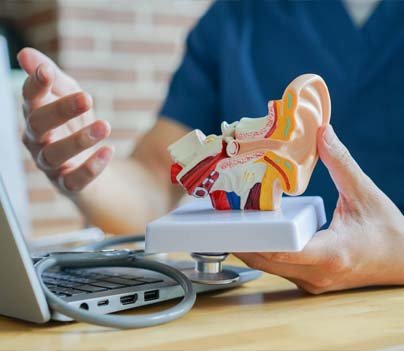Ear Infection

What is Ear Infection?
An ear infection is a common medical condition that occurs when the middle ear becomes inflamed or infected. This condition can affect both children and adults, but it is more common in children.
There are several types of ear infections, but the most common type is called acute otitis media (AOM). AOM occurs when bacteria or viruses cause the middle ear to become inflamed and filled with fluid. This can lead to symptoms such as ear pain, fever, and hearing loss.
Other types of ear infections include otitis media with effusion (OME), which is a non-infected fluid buildup in the middle ear, and chronic otitis media with effusion (COME), which is a persistent fluid buildup in the middle ear.
Ear infections can usually be treated with antibiotics and over-the-counter pain medications. However, in some cases, more aggressive treatment such as ear tubes or surgery may be necessary.
Best healthcare center for Ear Infections in India
Doxtreat strives to make the patient’s medical journey simple and hassle-free. Our affiliated hospitals are well-kept, offer the greatest facilities, and are fully furnished with the most recent technology.
Along with treatments, we also provide extra services like insurance assistance, a No-Cost EMI facility, patient transportation services, free follow-up visits, free lunches, free consultations, etc. From the initial consultation to the post-operative care, we handle it all. Make an appointment with one of our ENT doctors now for safe and efficient ear infection treatment.

When is Ear Infection Treatment Required?
Ear infections can occasionally get well on their own and may not even need treatment. However, if an ear infection lasts longer than three months or negatively affects everyday living, it could be necessary to seek prompt medical attention.

What Happens in Ear Infection Treatment?
The treatment of an ear infection depends on the type and severity of the infection. In most cases, acute otitis media (AOM) is treated with antibiotics to help clear the infection and reduce symptoms. Pain relief medication such as acetaminophen or ibuprofen can also be used to manage pain and fever.
For chronic ear infections or infections that do not respond to antibiotics, more aggressive treatments may be necessary. This can include the use of ear tubes to help drain fluid and relieve pressure in the ear, or surgery to repair any damage to the ear.
It is important to follow your doctor’s instructions for treatment and complete the full course of antibiotics, even if you start feeling better before the medication is finished. Failure to do so may result in the infection returning and becoming more difficult to treat.
Additionally, you can take steps to prevent ear infections by practicing good hygiene, avoiding exposure to cigarette smoke, and addressing any underlying conditions such as allergies or respiratory infections that may increase the risk of ear infections.

How to Prepare for Ear Infection Surgical Treatment?
If you are scheduled for ear infection surgical treatment, there are several things you can do to prepare:
- Follow your doctor’s instructions: Your doctor will give you specific instructions on how to prepare for the surgery, including any medications you should take or avoid, and what to eat or drink before the surgery. Make sure to follow these instructions carefully.
- Arrange for transportation: You will not be able to drive yourself home after the surgery, so arrange for someone to drive you to and from the hospital or surgical center.
- Arrange for aftercare: You may need someone to stay with you for a few days after the surgery to help with daily activities such as cooking, cleaning, and dressing.
- Avoid smoking: Smoking can slow down the healing process and increase the risk of complications. If you smoke, try to quit or at least avoid smoking for several days before and after the surgery.
- Stay informed: Ask your doctor any questions you may have about the surgery or the recovery process, and make sure you understand all the risks and benefits of the procedure.

How to Recover After Ear Infection Surgical Treatment?
Recovering from ear infection surgical treatment can take some time, but there are things you can do to help speed up the process and ensure a smooth recovery. Here are some tips:
- Follow your doctor’s instructions: Your doctor will give you specific instructions on how to care for the surgical site and manage any pain or discomfort. It is important to follow these instructions carefully to avoid complications.
- Rest: Rest is essential for the healing process, so take it easy and avoid any strenuous activities or heavy lifting for several days after the surgery.
- Apply cold compresses: Applying cold compresses to the affected ear can help reduce swelling and pain. Use a clean, damp cloth and apply it to the ear for 20-30 minutes at a time, several times a day.
- Take pain relief medication: Your doctor may prescribe pain relief medication to manage any discomfort. Make sure to take the medication as directed.
- Avoid getting water in your ear: Avoid swimming or getting water in your ear until your doctor clears you to do so.
- Attend follow-up appointments: Attend all follow-up appointments with your doctor to ensure the surgical site is healing properly and there are no complications.
- Eat a healthy diet: Eating a healthy diet can help support the healing process. Make sure to eat plenty of fruits, vegetables, and lean proteins.
- Avoid smoking: Smoking can slow down the healing process and increase the risk of complications. If you smoke, try to quit or at least avoid smoking for several days after the surgery.

